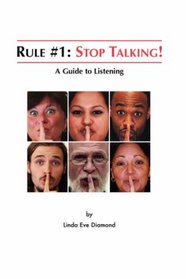Search -
Rule#1: Stop Talking!: A Guide to Listening
Rule1 Stop Talking A Guide to Listening
Author:
'Rule #1: Stop Talking!' teaches the fundamentals of listening, starting with an explanation of the importance of listening and then delving into listening "rules," which are accompanied by practical guidelines and explanations. Following chapters recognize and work with beliefs that interfere with-or "short circuit"-listening. T... more »
Author:
'Rule #1: Stop Talking!' teaches the fundamentals of listening, starting with an explanation of the importance of listening and then delving into listening "rules," which are accompanied by practical guidelines and explanations. Following chapters recognize and work with beliefs that interfere with-or "short circuit"-listening. T... more »
ISBN-13: 9781600050671
ISBN-10: 1600050670
Publication Date: 11/8/2007
Pages: 180
Rating: ?
ISBN-10: 1600050670
Publication Date: 11/8/2007
Pages: 180
Rating: ?
0 stars, based on 0 rating
Genres:
- Health, Fitness & Dieting >> Self-Help >> General
- Reference >> Words, Language & Grammar >> Communication
- Reference >> Words, Language & Grammar >> Linguistics




